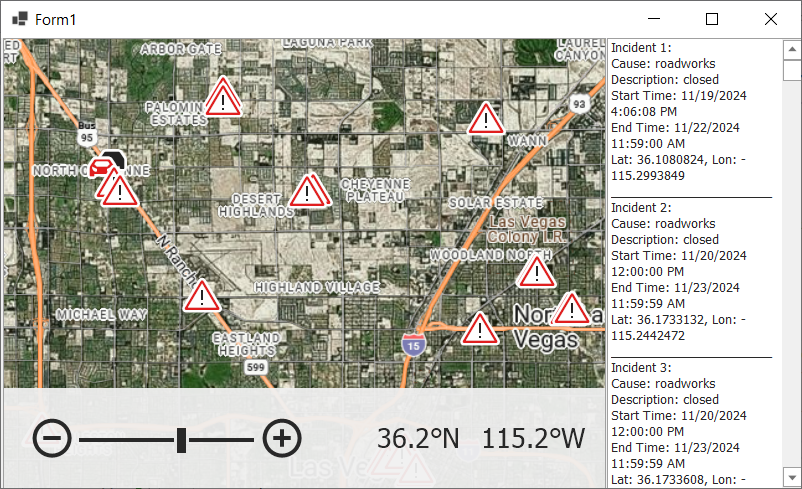AzureTrafficIncidentCalculationResult Class
Contains traffic incident results received from the Microsoft Azure service.
Namespace: DevExpress.XtraMap
Assembly: DevExpress.XtraMap.v25.2.dll
NuGet Package: DevExpress.Win.Map
Declaration
Related API Members
The following members return AzureTrafficIncidentCalculationResult objects:
Remarks
After you obtain a list of incidents in the RequestTrafficIncidents method, the provider raises the TrafficIncidentCalculated event. You can handle the event to access the collection of received incidents or add custom logic.
This example obtains a list of incidents in the specified area from the Azure Maps service and displays information about obtained incidents in a MemoEdit control:

using DevExpress.XtraMap;
using System.Text;
// ...
const string key = "your key";
AzureTrafficIncidentDataProvider trafficIncidentProvider;
// ...
public Form1() {
InitializeComponent();
trafficIncidentProvider = new AzureTrafficIncidentDataProvider {
AzureKey = key
};
imageLayer2.DataProvider = new AzureMapDataProvider() {
AzureKey = key,
Tileset = AzureTileset.BaseHybridRoad
};
imageLayer1.DataProvider = new AzureMapDataProvider() {
AzureKey = key,
Tileset = AzureTileset.Imagery,
};
informationLayer1.DataProvider = trafficIncidentProvider;
informationLayer1.DataRequestCompleted += OnDataRequestCompleted;
trafficIncidentProvider.TrafficIncidentCalculated += OnTrafficIncidentCalculated;
trafficIncidentProvider.RequestTrafficIncidents(new SearchBoundingBox(-115.338457, 36.268745,
-114.988268, 36.1010376), 18, -1,
new AzureTrafficIncidentOptions {
OriginalPosition = false,
IncidentGeometryType = AzureTrafficIncidentGeometryType.Shifted
});
}
void OnDataRequestCompleted(object sender, RequestCompletedEventArgs e) {
mapControl1.ZoomToFitLayerItems();
}
private void OnTrafficIncidentCalculated(object sender, AzureTrafficIncidentCalculatedEventArgs e) {
if (e.Cancelled) return;
if (e.RequestResult.ResultCode != RequestResultCode.Success) {
memoEdit1.Text = "Traffic incidents were not found for this area.";
return;
}
StringBuilder resultList = new StringBuilder("");
int resCounter = 1;
foreach (AzureTrafficIncidentResult resultInfo in e.RequestResult.IncidentResults) {
resultList.Append(string.Format("Incident {0}: \r\n", resCounter));
resultList.Append(string.Format("Cause: {0}\r\n", resultInfo.Cause));
resultList.Append(string.Format("Description: {0}\r\n", resultInfo.Description));
resultList.Append(string.Format("Start Time: {0}\r\n", resultInfo.StartDate));
resultList.Append(string.Format("End Time: {0}\r\n", resultInfo.EndDate));
resultList.Append(string.Format("Lat: {0}, Lon: {1}\r\n", resultInfo.Point.Latitude, resultInfo.Point.Longitude));
resultList.Append(string.Format("_______________________\r\n"));
resCounter++;
}
memoEdit1.Text = resultList.ToString();
}
Inheritance
Object
RequestResultBase
AzureTrafficIncidentCalculationResult
See Also